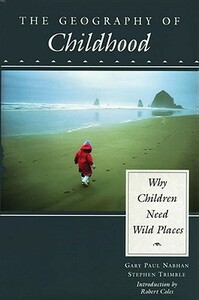Take a photo of a barcode or cover
5 reviews for:
The Geography of Childhood: Why Children Need Wild Places
Gary Nabhan, Stephen Trimble
5 reviews for:
The Geography of Childhood: Why Children Need Wild Places
Gary Nabhan, Stephen Trimble
Revisiting some grad school works now that I’m raising a wee one. I appreciate a lot about this book but it feels a bit dated and also a bit white and male, despite the authors’ good-faith efforts to seek some other perspectives.
This is a quick read, somewhat dry, yet quite sensible. Gary Paul Nabhan and Stephen Trimble use life experiences to portray the importance of wilderness in children's lives. The tactility of nature is important in the education of science where levels of knowledge can be acquired hands-on. Biology, animal science, ecology, geology, and geography are some of the major fields of study surfaced outdoors. It is necessary to take kids away from books, outside of the classroom, and away from the television in order for them to grasp science face to face. In addition, children can gain a sense a family by exploring with parents and siblings. Group activities also elicit communication skills, bonding, and collective interpretation.
I really did enjoy this book. It is comprised of essays about how children relate to nature. One of the interesting things that was mentioned was how adults seem to look at the big picture (think Grand Canyon) while the children were looking at the small things (think pebbles, feathers, etc.) It also talked about how children in rural areas are more connected to nature than children in more urban areas which makes sense. This was non-fiction but not dry. It was quite readable.
A library check-out 2007 that I mostly just skimmed. Didn't seem very useful since I presume it is preaching to the choir. But I'm curious why Lori disliked it so (Lori?).
If you liked Last child in the woods, you will like this as well. It is included in it's bibliography and that's how I found it. A quote from the book that I hear in my head whenever I see a child put an earth worm in their mouth - or tear the wings off of a fly... pg.95 Frank Burroughs says, "Let children be a hazard to nature and let nature be a hazard to them." I mean, there is a point, when you might prevent your child from encountering certain danger, but I think this book came out right as we were entering the helicopter-parent phenomena. It's good advice about allowing our kids to experience natural consequences.
The book also makes a call for diversity saying that formal education can undermine tradition and personal experience. It cannot replace spontaneous hands on experiences or inter-generational experiences. And a variety of organisms in the wild teaches tolerance - and even though tolerance is not what we seek today, it was the buzz word when this book was published for the same idea as diversity.
The book also makes a call for diversity saying that formal education can undermine tradition and personal experience. It cannot replace spontaneous hands on experiences or inter-generational experiences. And a variety of organisms in the wild teaches tolerance - and even though tolerance is not what we seek today, it was the buzz word when this book was published for the same idea as diversity.

